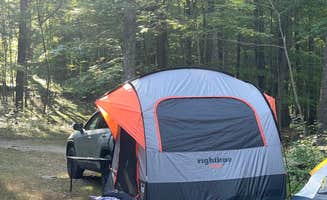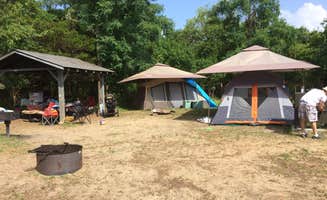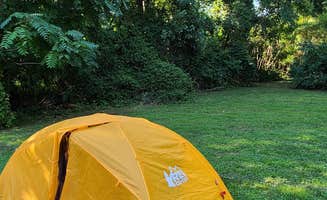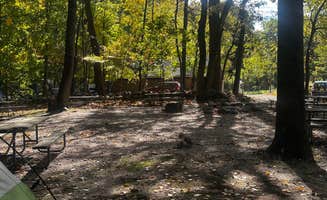Tent camping near Deer Park, New York ranges across several county parks and federal lands within a 50-mile radius. The region sits in the transition zone between coastal lowlands and the Hudson Highlands, with elevations varying from sea level to about 1,300 feet at higher points. Summer temperatures typically reach 80-90°F with moderate humidity, while spring and fall camping offers more comfortable 55-75°F conditions with less insect activity.
What to do
Hiking extensive trail systems: Ward Pound Ridge Reservation offers over 40 miles of marked hiking paths through diverse terrain. According to one visitor, "The best part of this campsite are the endless trails in the area. I believe there are over 40 miles of trails in this region. Would definitely recommend for those who want to camp near NYC but not drive too far."
Beach and water activities: Sandy Hook — Gateway National Recreation Area provides ocean access with lifeguarded swimming areas. "Ocean is close with lifeguards. Good fishing and pleasant people. Boat from New York City," notes one camper. The beach areas are typically open from Memorial Day through Labor Day.
Wildlife observation: Multiple campgrounds feature abundant wildlife viewing opportunities. "There are lots of bunnies!" reports a visitor to Croton Point Park. Early mornings and dusk offer the best viewing times when animals are most active, especially around water sources.
Stargazing by the water: Fire Island camping areas provide exceptional night sky viewing over water. A visitor to Watch Hill described the experience: "Listen to the waves crashing as you sleep and stargaze over the clear ocean." The best stargazing conditions occur on moonless nights away from the more developed areas.
What campers like
Privacy between tent sites: Battle Row Campground offers secluded tent camping areas set back from common spaces. "Each site is set back off a common area so there is plenty of privacy. It's great if your local easy in and out," explains one camper. The tent area contains 5-7 dedicated sites separated from the RV section.
Access to NYC while tent camping: Several campgrounds serve as convenient bases for city day trips. A Staten Island Gateway camper noted: "This place is awesome when it comes to finding an affordable place to stay while in NY... When it comes to sleeping near the city on a budget, this place will most likely work."
Lean-to shelter options: Several parks near Deer Park offer permanent shelters as alternatives to traditional tent camping. A Ward Pound Ridge Reservation visitor mentioned, "The shelter sites are large and private with access to hiking trails. The staff is friendly as well." These structures typically include three walls and a roof with an open front facing a fire ring.
Waterfront camping locations: Watch Hill Fire Island Campground provides tent sites near ocean beaches. "You can get a permit to backcountry camp instead of reserving a designated campground spot. Just walk down to the beach after check-in and walk east until you see a pole with a tent symbol on it," explains one camper who enjoyed the experience.
What you should know
Mosquito preparation is essential: Insect activity varies dramatically by location and season. A Watch Hill camper warns: "However, it was nearly impossible to enjoy ourselves because we were getting attacked by mosquitoes and horseflies the entire weekend. Even with the bug spray, the relief didn't last long." Bring head nets and full-coverage clothing for evening hours.
Reservation systems vary significantly: Many campgrounds near Deer Park require in-person booking. A visitor to Mountain Lakes Park noted, "A fun option available at Mountain lakes is to rent a yurt to camp in." Call ahead to verify reservation processes as most don't offer online booking systems.
Fire regulations differ between parks: Some locations have strict fire container requirements. A Battle Row camper explained: "There are NO fire pits, you must bring your own. Fires are allowed but you must have a fire container or bucket for your fire off of the ground." Check individual park rules before arrival.
Transportation logistics: Some tent camping areas require significant walking with gear. At Fire Island, one camper shared: "It is about a mile to three miles to the closest campsites on the western side. Very secluded, and peaceful weekend by the water." Plan accordingly with appropriate equipment transport solutions.
Tips for camping with families
Choose sites with playground access: Several parks feature play areas near tent camping sections. A Sandy Hook camper mentioned, "There is even a trail that runs parallel to the beach making it a scenic ride. There is a cost to enter the park (unless you bike in) but it's free after 5:00." Many campsites are within walking distance of these amenities.
Book early for holiday weekends: Family-friendly campgrounds fill quickly during peak periods. One Croton Point Park visitor advised, "I took my 5 year old-son and wife, all of us first time campers. this place was great. The site was very nice, all the people friendly and area beautiful." Reservations typically open 6 months in advance.
Pack for variable weather: Temperature fluctuations can be significant even in summer months. A camper at Webb Mountain Park recommended bringing "layers for cooler evenings, especially in spring and fall when overnight temperatures can drop into the 40s."
Seek out educational programming: Several parks offer ranger-led activities. According to a Watch Hill camper: "There are park rangers on site and have excellent programs for kids." These programs typically run weekends from Memorial Day through Labor Day.
Tips from RVers
Electrical hookup availability: Most campgrounds offering tent camping near Deer Park, New York have limited electrical options. At Campgaw Mountain Reservation, sites are "fairly close to the road and there are super popular hiking trails that run right through all the camps."
Mixed-use camping areas: Many parks separate RV and tent camping sections. At Croton Point Park, one RVer observed: "Tent site is after the RV site, so use their LX before you get to site if you can. Dumpster and water near sites." This arrangement helps maintain quieter tent areas away from generator noise.
Site size considerations: RV campers should verify vehicle length restrictions. According to one visitor: "The FHU sites were back-to-back and although there were trees separating the sites, they were close together." Most campgrounds limit RVs to 35 feet or less due to narrow access roads and limited turning radii.






